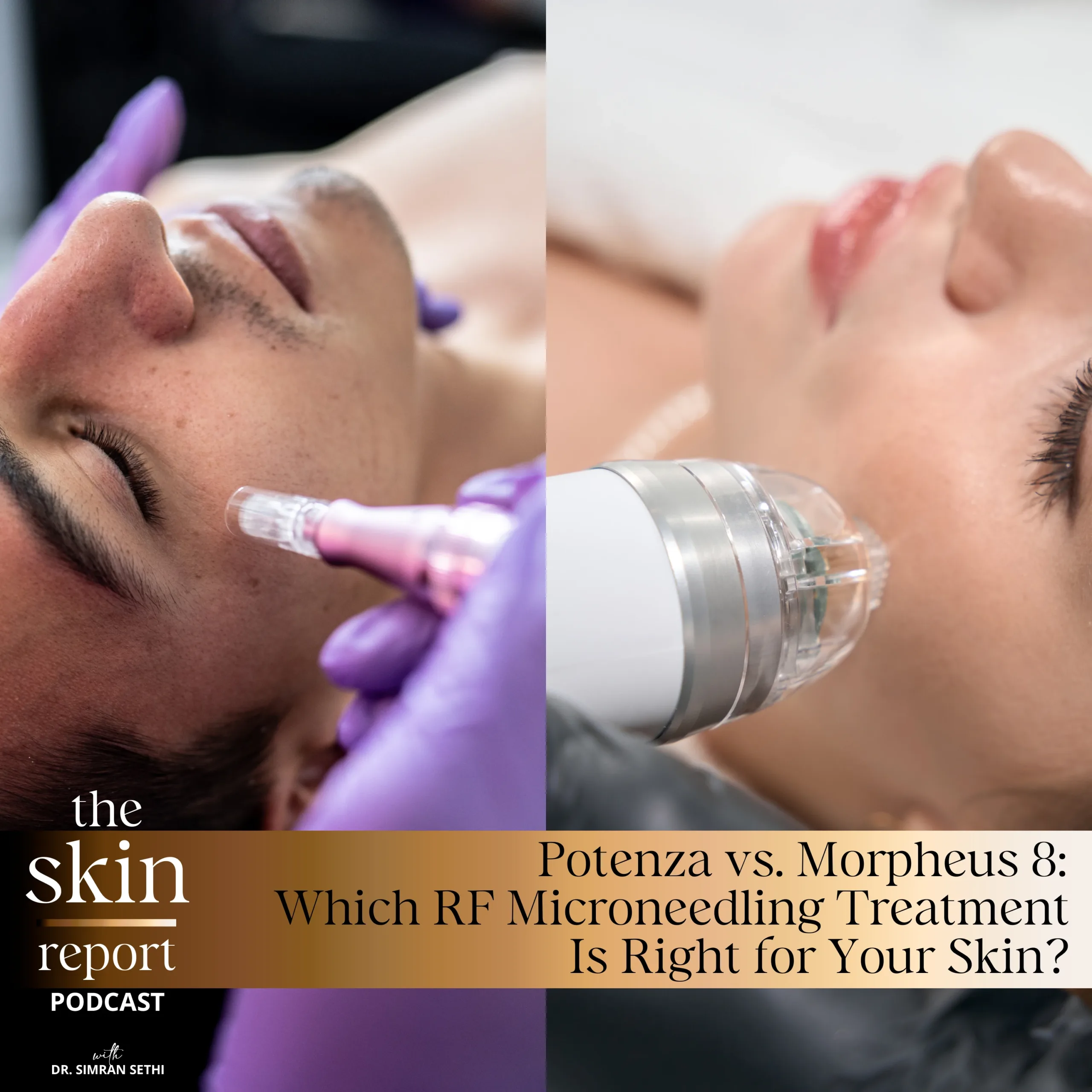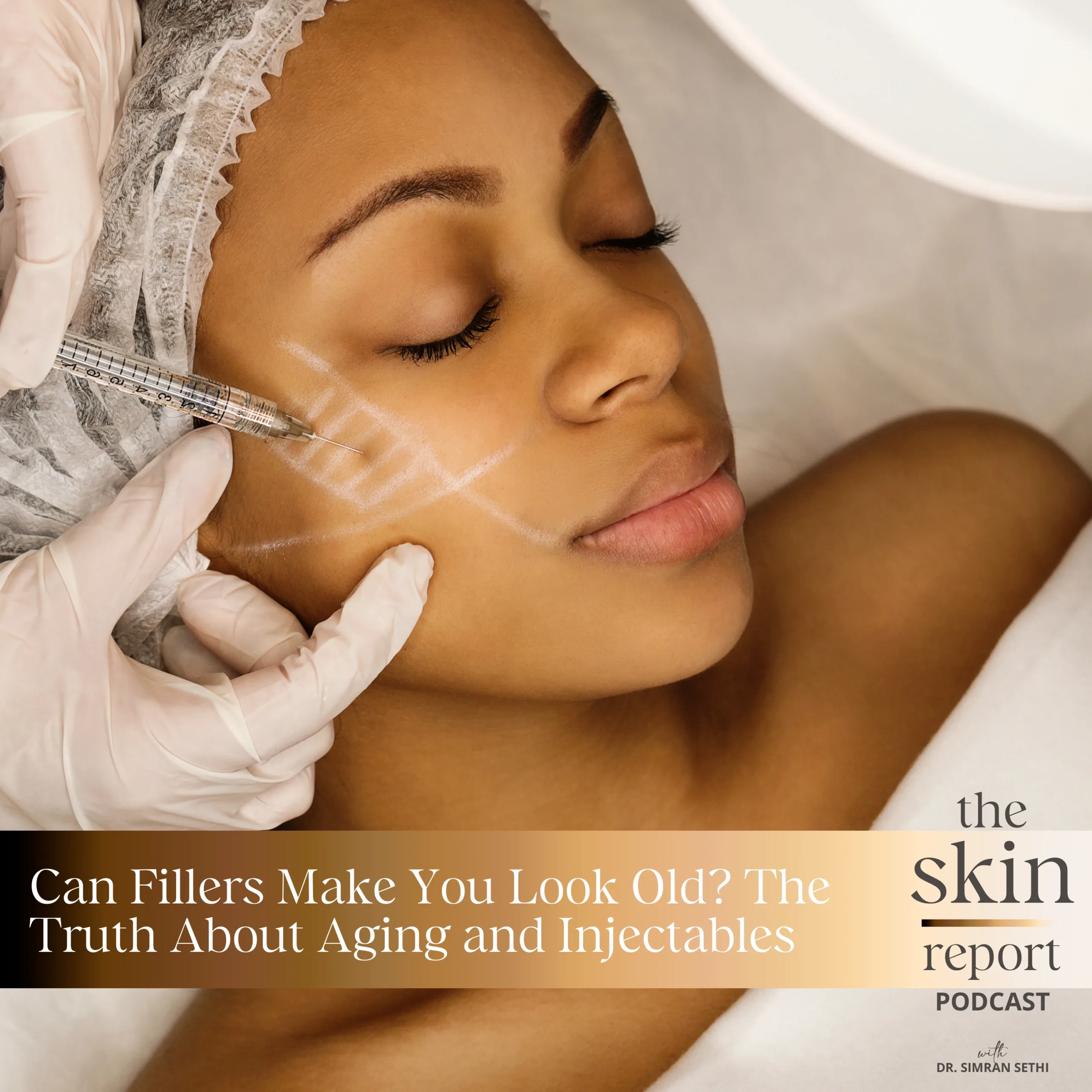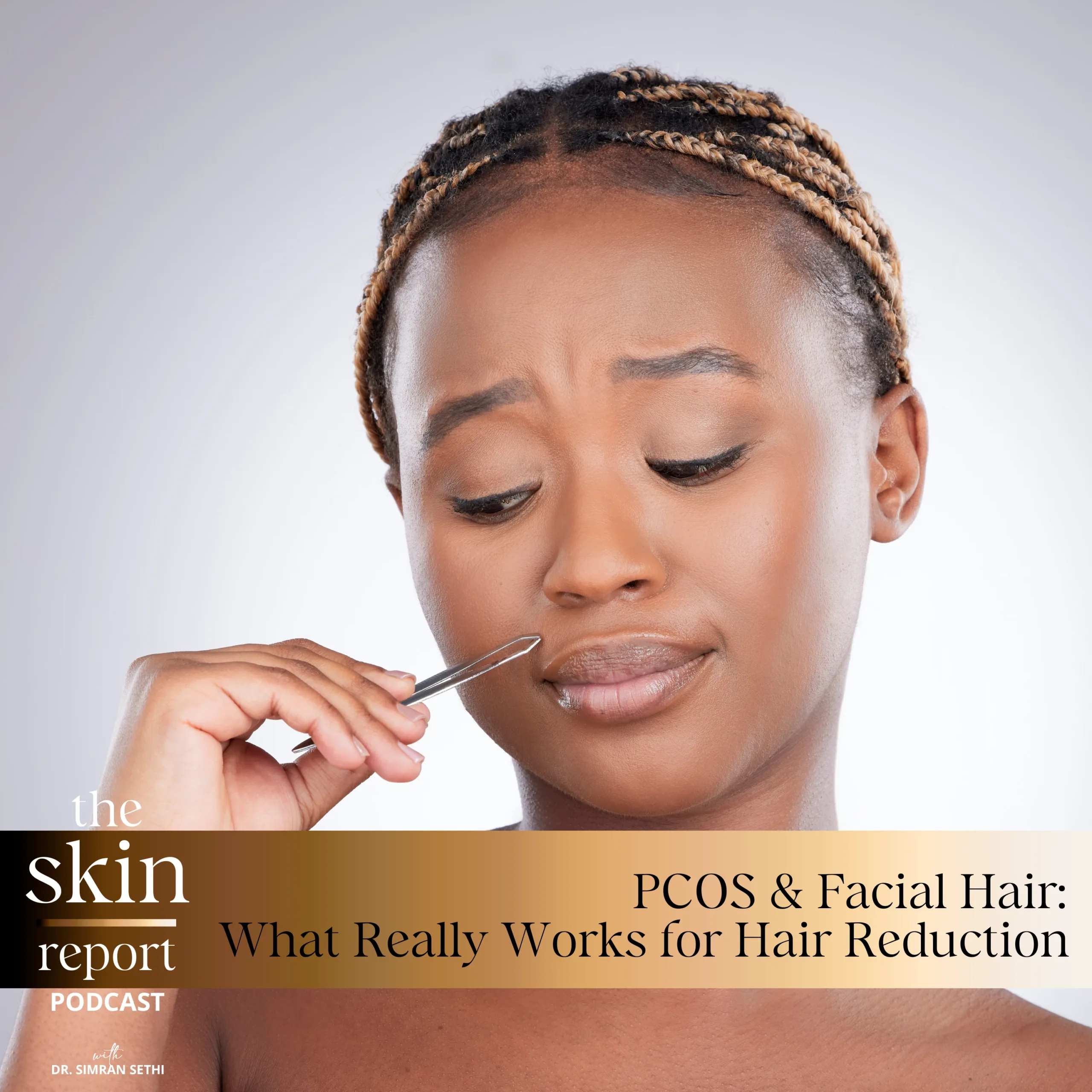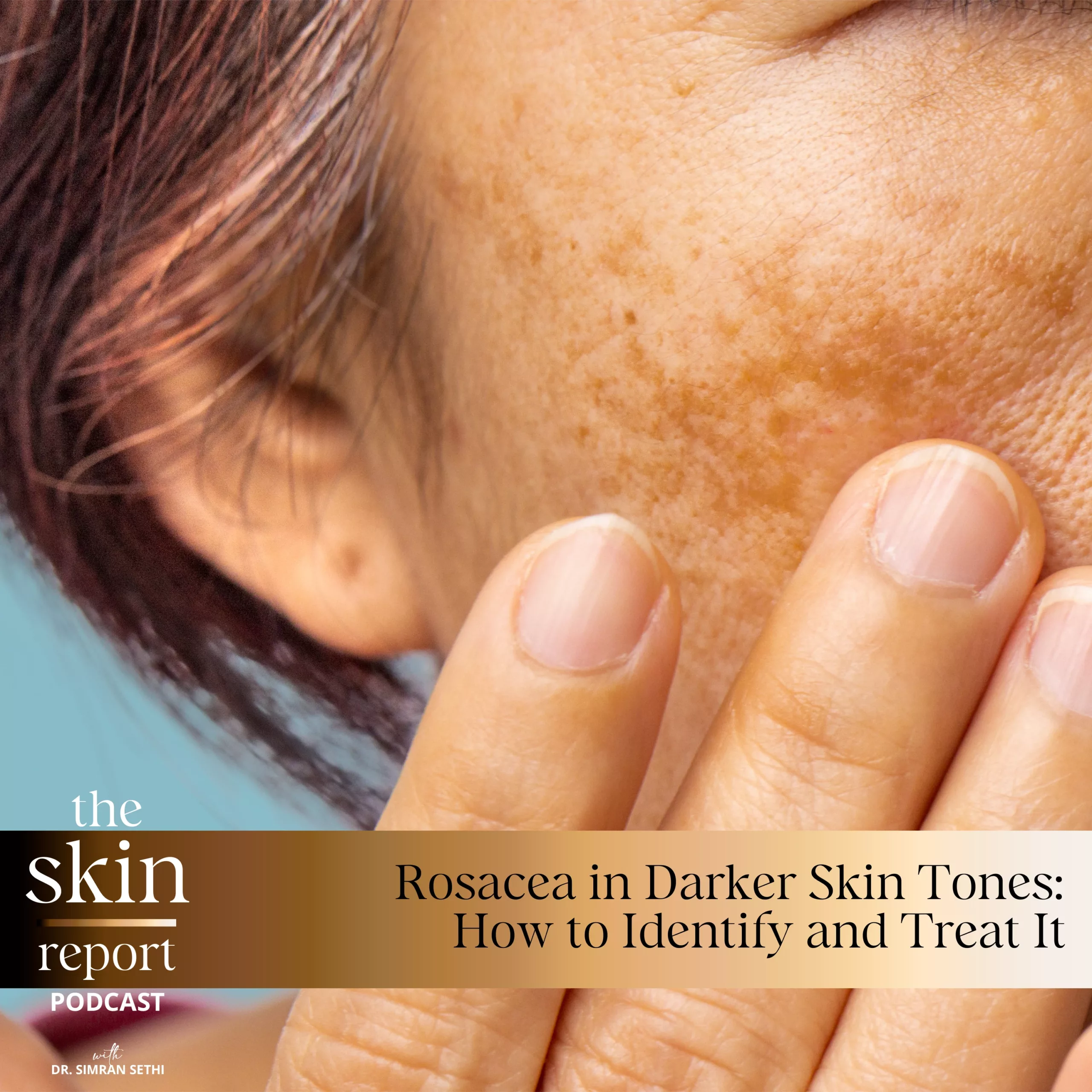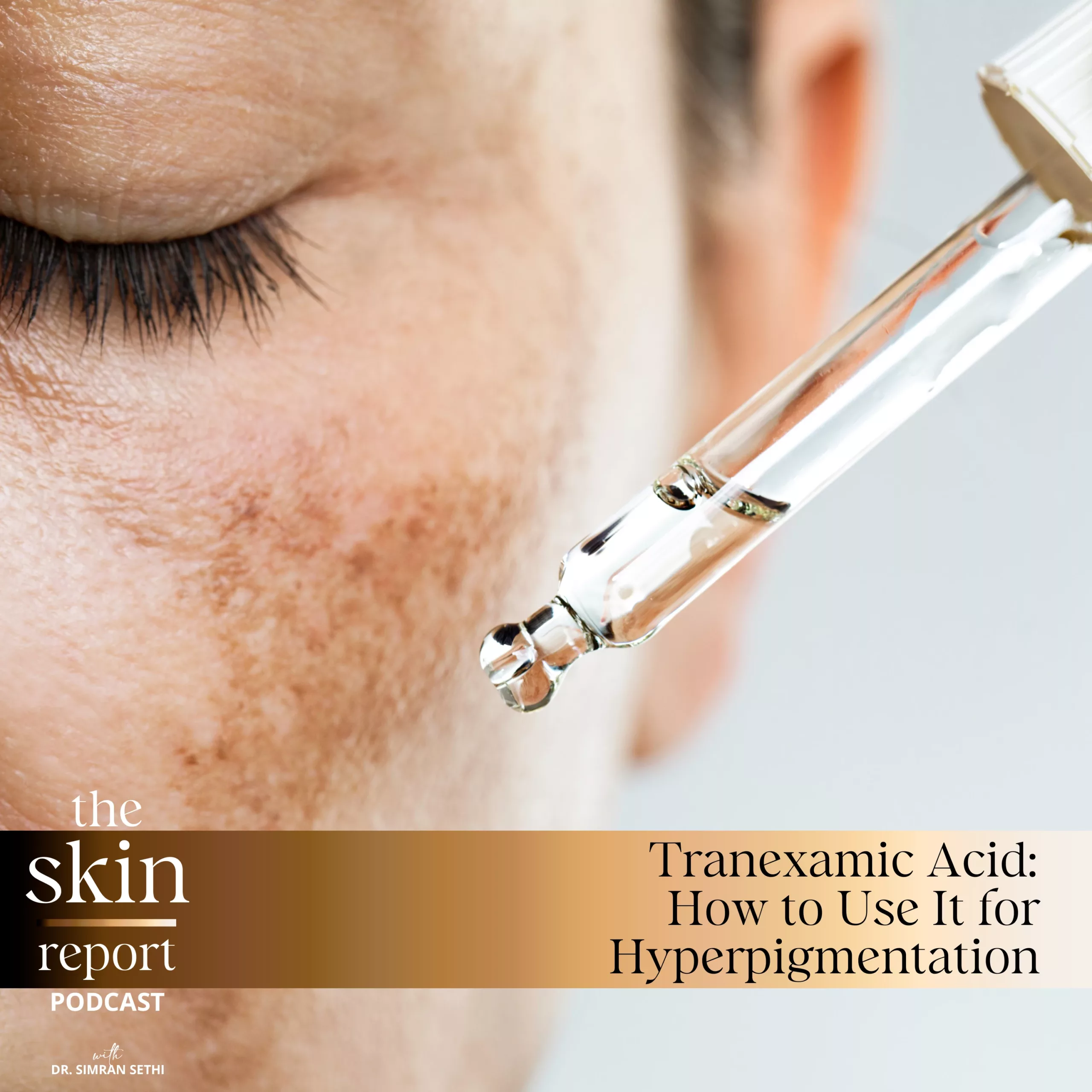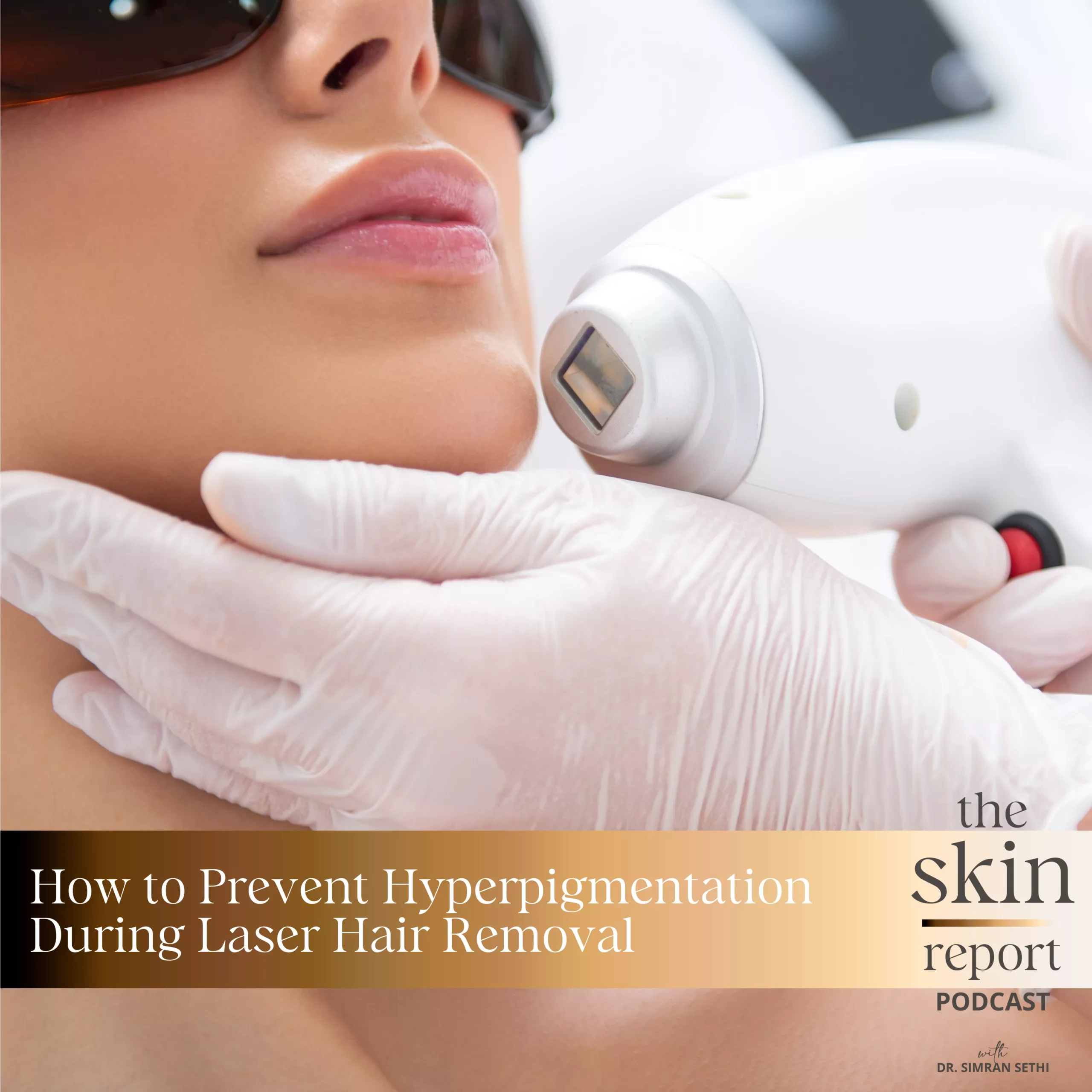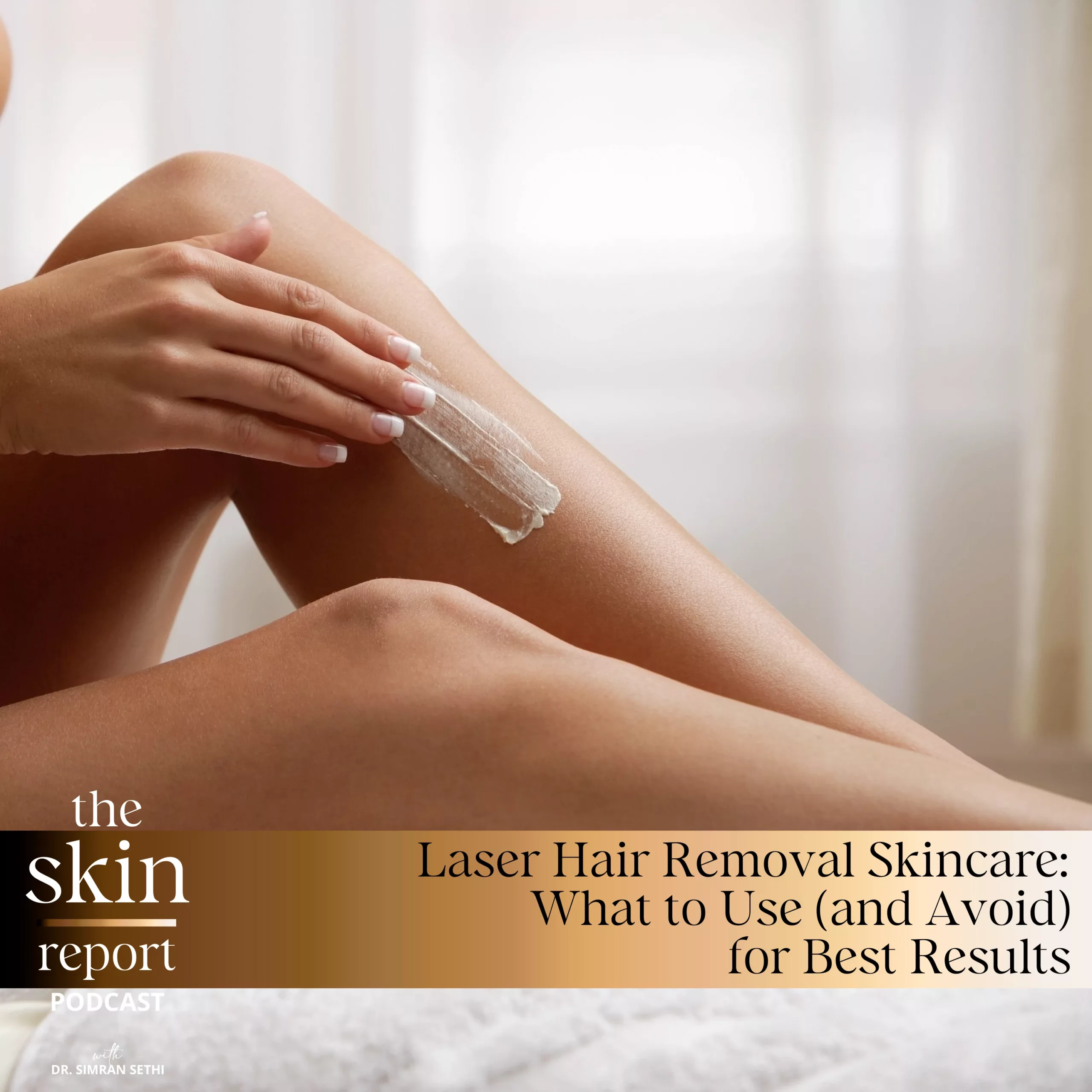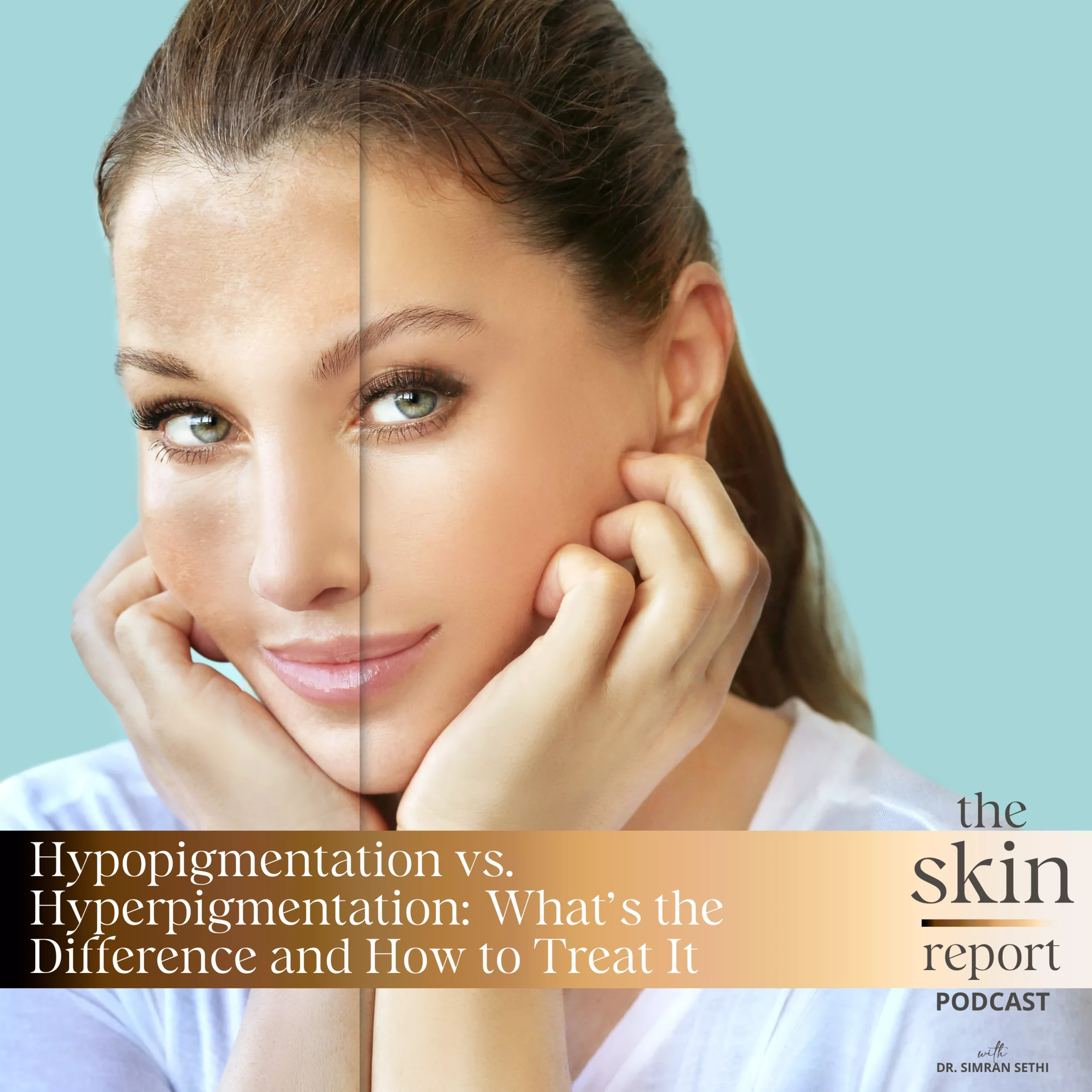Smart Choices in Injectables for Every Stage of Life
Today we focus on the tailored use of injectables across different life stages and skin tones. We explore the various types of injectables like Botox, dermal fillers, and Sculptra, and their appropriate applications from your 20s to 50s. With an emphasis on skin science, aesthetic goals, and the nuances of skin tones, this episode provides valuable insights for anyone considering injectables as part of their beauty regimen. Listen in for advice on when to start, what to consider based on your age and skin tone, and how to achieve natural-looking results. Whether you’re new to the world of medical aesthetics or looking to refine your approach to anti-aging treatments, this episode is packed with expert knowledge and practical tips.
Exclusive Offer for the Skin Report Audience:
Use SKINREPORT20 in the shopping cart to receive 20% discount
LEARN MORE!
The Skin Report Podcast : Subscribe and Download!
Skin By Dr. Sethi – Blog
Skin By Dr. Sethi – Skincare
Skin By Dr. Sethi – Beauty Instagram
Dr. Sethi’s Medical Spa
Dr. Sethi’s Medical Spa – Instagram
Dr. Simran sethi:
Dr. Sejal Darya Patel is dual board certified in reproductive endocrinology and gynecology with more than 20 years of experience in medicine. Dr. Patel is joining us today to share her expertise in diagnosing and treating women with polycystic ovarian syndrome. And make sure you stay tuned till the end of this episode where she debunks common PCOS myths. If you haven’t done so already, make sure you subscribe, like and ask us any questions in the comments. With that, let’s get started.
Hello, everyone. Welcome back to The SKIN Report. Today I’m really excited to talk to a very special guest, Dr. Sejal Patel. We are going to talk about a topic that is extremely important and often I think under diagnosed. And I just think that there isn’t enough about it, which is why I invited her because she’s an expert in polycystic ovarian syndrome, PCOS. So I’m going to go ahead and start. Thank you for being here today, Dr. Patel.
Dr. Sejal Patel:
Absolutely. Thank you for having me.
Dr. Simran sethi:
What is PCOS?
Dr. Sejal Patel:
Sure. So polycystic ovarian syndrome or PCOS, it’s a really complex variable syndrome. It is focused in on two major parts. One is increased androgenism, so increased androgen production. And second, irregular ovulation or irregular period. These two in particular really set the stage for polycystic ovarian syndrome. From there there’s other associated abnormalities, but those are probably the two biggest components to PCOS. Very different in presentation. Some women will present with insulin resistant and weight gain. Some patients will present with problematic care for us. Some patients may present with infertility. And as I think you beautifully said, it’s definitely not talked about enough and really affect about 10 to 15% of women significantly in terms of their daily life so I’m really grateful that you’ve brought that topic up today.
Dr. Simran sethi:
Yeah, no, 10 to 15% is a huge number. And like you said, I think it’s because there’s such a variability in the symptoms, it is often underdiagnosed. What do you think is the time when most women are diagnosed with PCOS? Is it in their teen years or in their 20s?
Dr. Sejal Patel:
I think it’s a great question. It really depends. Because it’s such a complex disease process, so we know there are issues with irregular and anovulation, so with those two in particular, we’re going to see some women who present as teenagers just not having periods. Mom is worried, takes them in to be evaluated. Maybe the teenager who has just at puberty started to have a lot of weight gain. Abdominal weight gain is classic for polycystic ovarian syndrome, and this has affected this teenager’s body image. It’s leading to maybe other factors, eating disorders so forth. That could lend to initial diagnosis. So in teenagers it would be, I would say most commonly irregular periods, noticing increasing facial hair growth that’s affecting their body image, or abdominal weight gain, which is again affecting their daily life, function, self-image.
Then the other time you’ll see it presented will be in women when they’re first married or on their own wanting to start their family. And in that scenario, they may notice they have irregular cycles, so they can’t time ovulation. That’s a second opportunity when patients will present, is, “I feel like my natural fertility is not in place. Can I see yo?”
Third, it could be in adulthood where women start to develop problematic hair growth with obesity and they’re trying to figure out what is the endocrine disorder underlying this, even if they’re not trying to conceive.
All of those factors I think can lend itself to why patients would present.
Dr. Simran sethi:
And this explains why in my aesthetics practice, a lot of times it seems like I’m the one diagnosing the PCOS because women will come to the office because of excess hair growth, sometimes hair loss on their scalp, and again, also for body sculpting because of excess weight gain at an earlier age. A lot of times it’s just shocking when a woman will say that she has to shave every day, otherwise she has so much facial growth that she doesn’t want to be seen outside. And in a lot of women, this leads to hyperpigmentation around their mouth, on their chin. So like you said, it is often undiagnosed. And when it is, there are all these different types of symptoms and the patient may not go to the right physician to seek diagnosis or help. So is there any data to suggest that PCOS is more common in certain ethnicities?
Dr. Sejal Patel:
PCOS originally has been genetically linked to almost 50,000 to 60,000 years ago. This is a recent publication, 2022. It actually is prevalent amongst all ethnicities. However, yes, you are correct. And honestly the way I trained, it was Middle Eastern, Southeast Asian, Indian, Pakistani, even Central American. You are going to see a lot more of the classic presentation of PCOS. Western, European, Caucasians, those patients with polycystic ovarian syndrome will actually present with obesity first. Really east Asians are going to present with very mild hirsutism. If you look in their follicular fluid in the ovaries though, they have high levels of testosterone, but it’s not clinically apparent, so you can’t use problematic hair growth to make that diagnosis for them for centralized obesity. So the presentation is different, but I would agree with you, I think ethnicities that are going to present first view ethnicities that may be more easily diagnosed are going to be the Middle Eastern, Pakistani, Indian, Central America.
Dr. Simran sethi:
And like you said, I think it’s because they present with these more I would say problematic or visual issues that makes them go and seek treatment. Now, the most common treatment I have encountered that women are under when they have PCOS is to be put on birth control, but a lot of times that doesn’t affect the excess hair growth they’re experiencing on their face. Sometimes some of them also develop a lot of acne. And so it’s a very common thing for their physician to put them on birth control. It doesn’t make a very big difference in hair growth. What have you found are better things that could be done in terms of treatment?
Dr. Sejal Patel:
When you’re looking at treatment of polycystic ovarian syndrome, it really depends on what you’re treating. So generally, most patients are going to present to their OBGYN or their primary care or their endocrinologist with irregular menstrual cycles, acne, problematic hair growth. So for that patient, a birth control pill will actually help the underlying issues with menstruation, the underlying effects on androgens. So you’re going to, from the liver, forgive the technical speak, increase sex hormone binding globulin, which is going to kind of chomp up all the testosterone, so it should lower your androgens theoretically reducing say the conversion of vellus hair to terminal hair or the presence of terminal hairs, right? Also decreasing sebum production and oily skin and controlling menstrual cycles.
However, it doesn’t adequately treat terminal hair growth just like you perfectly said. And so these women feel super unsatisfied after being on a birth control pill, even though it’s medically treating them. If they are obese or insulin resistant, you can use medications like metformin to really help them with not only controlling the insulin resistance but then also controlling weight.
There are issues with androgens, male hormones, whether it’s oily skin or problematic hair growth, you can use a medication like spironolactone, but it does have side effects. Dizziness. It can cause fatigue, dry skin. And it must be stopped three months before conception. In genuine sincerity, when I have patients, although my practice is focused on fertility, but when I have patients who have unwanted facial hair or excess sebum production, I’ll be referring them and have always referred them to specialists like yourself because I think you need to target the terminal hairs that are present. I think as a physician we’re trying to help our patients by prescribing a medication, and that’s only going to help the underlying endocrine system, whereas a specialist like yourself is actually going to be able to adequately treat terminal hairs and skin abnormalities, which will kind of help them the most.
Dr. Simran sethi:
It’s great that you take the time to refer them. A lot of times a lot of patients who end up coming to my office come because of exploration they’ve done by themselves and they’re told that, “Excess hair growth, that acne, it’s just not as important to be focused on. So you just got to have to live with it and be happy that at least we’re improving your ovulation.” And that can be very frustrating because it is a very, very important part of their well-being. And so many of them do come in looking for laser hair removal, not surprising, or treatment of acne and acne because again, most women with dark hair who fall into those ethnicities you earlier mentioned, for them when they have excess hair growth, they also develop a lot of post-inflammatory hyperpigmentation around their mouth, on their chin because they’re removing hair using a razor or plucking every day or they’re waxing every other day. So this causes a lot of trauma on the skin as well. So now when they come in, usually they’re looking for laser hair removal.
I also actually have found that putting them on spironolactone first makes their hair growths become more normal. And then we do take them through a series of laser hair just like they normally would so they can start experiencing the benefits of the laser hair removal. Then we start working on that post-inflammatory hyperpigmentation using things like micro needling and acne control, facials and so forth.
Dr. Sejal Patel:
That makes so much sense, and I think it’s really a matter of setting expectations for patients as well, that you’re going to your physician. And if you’re going to an endocrinologist, they’re going to treat the underlying endocrinopathy. If you’re going to the OBGYN, they’re going to be treating the underlying menstrual cycle disturbances. And you have to go to the skin specialist to treat the skin abnormalities because it’s not going to be one treatment that I think holistically can treat such a complex and heterogeneous syndrome. And so it’s really great that there’s so many specialists who can kind of contribute to treating the patient holistically. So I love that actually. But you’re right, I think it is a matter of resetting expectations because it would be unfair for me to try and treat skin hyperpigmentation or problematic hair growth. That is why I would go to you. And yet it would be unfair for you to try and figure out how am I going to help my patient to ovulate.
Dr. Simran sethi:
It is a sort of a multi-system approach. If a woman went through her life with PCOS and she did absolutely nothing about it, would there be any long-term health implications to that or would she grow out of it?
Dr. Sejal Patel:
No, and that’s an awesome question. There’s a lot of health implications. And the fact that we’re not empowering and educating our women to know this I think puts them at a disadvantage long term. So we know there’s abnormalities with insulin sensitivity, whether it’s compensatory or it’s original. We also know there’s issues with metabolic obesity, central abdominal obesity. So women with polycystic ovarian syndrome who do nothing, 50% are going to end up with hyperinsulinemia, ultimately insulin resistance and diabetes. A large percentage will also have metabolic syndrome, so hypertension, abnormal lipids or cholesterol, coronary artery disease, and diabetes.
From the PCOS, if you do nothing, a large percentage will actually develop obstructive sleep apnea and those subsequent abnormalities with hypoxia and the sequelae there. And a lot of women, if they do nothing, do not realize the impact of body image because as you appropriately said, sometimes we’re out treating the patient holistically. And so with that body image, you can have long-term issues with anxiety, depression, ultimately eating disorders and what that ultimately leads to.
In allopathic medicine, I would say obviously we’re the most concerned about high blood pressure, we’re the most concerned about diabetes, we’re the most concerned about coronary artery disease. I think if I was a mental health provider, I’d probably be most concerned about anxiety, depression, the eating disorders. And then if I was somebody who had to provide anesthesia or even just worried about in general, sleep and oxygenation, I’d be worried about obstructive sleep apnea, so I definitely think they’re long-term sequelae if you do nothing. And I think that’s one of the most important points for women with PCOS is to be really proactive about your health because unless you know you’re at risk for all of these things, how do you advocate for yourself? If you have a typical chest pain and you have PCOS, you’re at really high risk for a cardiac event and you really need to be as educated as you can be about your own body.
Dr. Simran sethi:
No, it’s so true. And like you said, advocating even with your physicians at an early age to help with diagnosis of PCOS. And again, this kind of comes back to the diagnostic part. When I was just doing general internal medicine, I found that there was never… At least I never encountered a proper diagnostic pathway for PCOS. It was very much of medical diagnosis. You take the symptoms and say, “Okay, well this sounds like this could be PCOS.” What’s a more formal way to diagnose it?
Dr. Sejal Patel:
So we’re not actually that much further off from when you were making that diagnosis. So original diagnostic… Not the original, but one of the more commonly quoted is the 1990 consensus statement from the NIH that said you should have irregular periods and some evidence of increased androgens, problematic hair growth, oily skin, elevated testosterone. 2003, the Rotterdam criteria came out and they said, “You should have irregular cycles or anovulation, problematic hair growth or elevated androgens, and on ultrasound you can have what looks like polycystic ovaries.” Polycystic ovaries are small, tiny follicles that are between 2 to 9 millimeters, and you should have more than 20 of them, and it can be done anytime in this cycle.
Then most recently in 2023, the International Evidence-Based Consensus opinion says the criteria for polycystic ovarian syndrome is irregular cycles or evidence of non ovulating, problematic hair growth or elevated androgens, ultrasound. And if you need to, a blood test called AMH, anti-müllerian hormone, which is also kind of a quantitative assessment of your ovarian research. If you have the first two, irregular cycles and ovulation and problematic hair growth, you actually don’t need the other two. But if there’s some question, you’re suspicious, then you can use the other two to help in that diagnostic modality. And that’s probably one of the reasons why skin care, self-image, it’s not even part of the picture because it’s not part of the classic diagnostic criteria. So interestingly enough, 50% of patients have insulin abnormalities, but that’s not part of the diagnostic criteria for polycystic ovarian syndrome.
Dr. Simran sethi:
Yeah. You know what? That is so true. You’re right. It seems to be sort of like an incidental finding after somebody has had that diagnosis of PCOS. It doesn’t really actually get investigated unless they were just doing an annual exam and labs and so forth. So if there is someone who thinks they have PCOS or at least wants to learn more about it to advocate for themselves, are there any resources that you think are reliable that the general public can access?
Dr. Sejal Patel:
No. And I think this is really important, right? Because we all use different search engines, I’ll just say Google because that’s the one that pops up as my default browser, to gain information. And you have to be really careful because those algorithms will lead you down a path that you’re trying to get information on. I personally love the American Society for Reproductive Medicine. They have an entire patient education website called reproductivefacts.org. These patient education committees, earlier in my career, I sat on this committee. It’s a number of board certified reproductive endocrinologists. They’re actually vetting out the validity of every document that gets published. So you know it’s accurate, it’s written in terms that are very easy to understand if you don’t have a medical background and really lays out diagnosis, medical therapy. And obviously the American Society for Reproductive Medicine is going to be more fertility-driven and overall health.
The other is the American Congress of OBGYN, ACOG. And it’s acog.org. And under that, the link on the right where you have your three lines, when you click on it, there’s an area… That tells you how tech-savvy I am, God bless. There’s an area where you link on patient resources and it has little videos and little information segments, again, written by board-certified OBGYNs. You’ll probably also find information to the American Association of Clinical Endocrinologists. And that’s going to be very accurate, very endocrine-based. The American Society for Reproductive Medicine and the American Congress of OBGYN though, those two are really easy to navigate, and I send my patients.
Dr. Simran sethi:
Like you said, if you go on Google, it can put you down a rabbit hole. And even TikTok, which is where a lot of people get their information in small bits. And putting it all together can… Some of this information can be very complex, and getting it from a reliable source is very, very important because it affects how you continue to help yourself and your symptoms.
Now before we leave, I wanted to see if you had heard of any PCOS myths that you really, really want to dispel for all the listeners today. I can start with one that I hear a lot, and that is… I don’t know if this is also an ethnicity thing, but I hear this a lot in women of South Asian descent. They’re very scared of taking birth control, especially their mothers. Their mothers are very scared to put them on birth control because they think that it’ll affect their fertility later on. What would you say to a parent who says that to you if their child has PCOS and you really think that they need to start birth control?
Dr. Sejal Patel:
Wow, that’s actually so interesting. What I would share with that mom is, “I am absolutely empathetic to the fact that you are fearful of birth control affecting her fertility, but in fact, if you look at the science, the birth control is going to prevent long-term sequelae associated with PCOS.” One of the things I failed to mention when you ask me about long-term outcomes that I’d like to jump back in and make sure I don’t forget to include is when women do ovulate and have regular cycles, they’re at really high risk for precancerous lesions of the lining of the uterus, overgrowth of the uterine lining like endometrial hyperplasia and endometrial cancer. So coming back to dispelling the myth, I would say the birth control pill helps your daughter to have regular menstrual cycles and could prevent worse outcomes like precancerous lesions of the uterus.
When I speak colloquially to patients, I’ll also usually say, “Birth control, in my opinion, is almost like makeup. It just covers up whatever your underlying issues may be, and it evens everything out, but it doesn’t actually fix the underlying issue.” And so I try to give reassurance to patients when they’re like, “Well, will birth control temporarily have long-term side effects, or will birth control temporarily affect it.” No, it’s actually just evening out your menstrual cycles to get you a better handle on the disease itself.
Myths I have also heard would be different juices to try, different supplements, eating hot foods or cold foods, talking about limes or lemons to bring on menstrual cycles.
Dr. Simran sethi:
Oh, I’ve never heard of that one.
Dr. Sejal Patel:
So I’ve definitely heard some myths, which really require a poker face when you’re trying to respond to patients to not minimize what’s probably generational and be passed down, but then also trying to educate them on at least what the science says. It’s not that lemons and limes won’t bring on your menstrual cycle. I’m not sure though how effective it is in controlling the underlying endocrinopathy associated with PCOS. So that’s a great question. And I, off the top of my head, can’t think of very many, but that one in particular came to mind.
Dr. Simran sethi:
Are there any supplements that people should be on to help? Or there’s really nothing that is… Or more targeted towards PCOS symptoms?
Dr. Sejal Patel:
Sure. I’m really glad you actually brought this up because I think this is really important to not forget. The first line treatment in patients with polycystic ovarian syndrome is actually your lifestyle. It is identifying a diet that is very low in inflammation, high in antioxidant. So very similar to a Mediterranean diet. Diets that are high in fruits, veggies, nuts, beans and lean protein. Stay away from the really good things in life, like the refined white bread, white pasta, simple sweets, fried and processed foods. That’s probably the most helpful because we do believe that there is a role at a microscopic level of inflammation affecting actually egg quality in patients with PCOS. So diet’s important.
That also helps to control if you’re sensitive to insulin, if you’re at risk for insulin resistance, that’ll help to control that. And then the abdominal weight gain. Exercise. 150 to 300 minutes of moderate exercise in a week, so about 30 minutes a day. And I oftentimes tell patients, “You don’t have to join a really expensive gym.” I mean, first walk around your neighborhood, exercises you can do in your home, any of those will have a benefit in terms of your metabolism.
Supplements. I think a multivitamin, very helpful. I think a probiotic because we know the gut microbiome has a role as well. And then in patients attempting conception, there is some advantages to myo-inositol, and we recommend that in our fertility practice for patients when they’re on that journey. Does it help a woman who’s not interested in conception? I think that data’s a bit more unclear because there’s not as much published data there. So probably not for somebody not as interested in conception, but for somebody who is, myo-inositol is going to really help to lower some of those peripheral androgens.
Dr. Simran sethi:
Excellent. Well, Dr. Patel, thank you so much. We’ve learned, I’ve learned a lot from our conversation,.and if any of our listeners want to find you, how would they do that?
Dr. Sejal Patel:
Sure. So I’m actually based in Orlando, but I am part of a great group, CRM Orlando, and we’re at ivforlando.org. You’re welcome to read our patient information online and/or set up a telehealth consultation with any of my partners or myself. We’re happy to help anybody who’s on this journey to starting their family with PCOS.
Dr. Simran sethi:
Great. Thank you so much.
Dr. Sejal Patel:
Thank you for your time and thanks for chatting with me today.
Dr. Simran sethi:
I hope you enjoyed this conversation. And again, if you haven’t already done so, subscribe to our channel so that you can get notifications when we publish more content.



